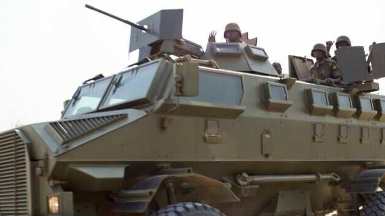Rebels accuse Egypt of supplying arms to S. Sudan government
By Tesfa-Alem Tekle
April 11, 2014 (ADDIS ABABA) – The SPLM/A in Opposition rebel group led by former vice-president Riek Machar has accused the Egyptian government of providing military support to the South Sudanese government.

Rebel officials said that in addition to Ugandan military support, Sudanese rebel groups JEM and SPLM-N were in direct combat against its forces alongside the South Sudanese army (SPLA).
The SPLM splinter group says the intervention of foreign forces not only contravenes the country’s territorial integrity, but is also in violation of international laws, calling on external forces to immediately withdraw from the country.
JONGLEI CANAL PLAN
The group further accused president Salva Kiir of secretly planning to reinvigorate the Jonglei canal project, a source of conflict dating back to 1983.
Under the proposal water would be diverted through the vast Sudd wetlands of, delivering more greater flows downstream to Egypt.
Rebels claim the move would displace the majority of the population of the upper Nile region and deny them their traditional livelihood, while allowing some two-and-a-half million Egyptian farmers (known as fellahin) to resettle along the canal.
Sudan Tribune was unable to independently verify the claims.
However, SPLM in Opposition youth wing president Puot Kang Chol said if the canal goes ahead it would turn the Greater Upper Nile turn into the war zone.
Rebels have called for an end to any external military support to the Kiir government and for regional nations to take a neutral position if the crisis in South Sudan is to be resolved sooner.
“We urge them (the Egyptians) to undertake a neutral and impartial position in this crisis as they did during our 50 years of struggle,” said Chol.
REGIONAL FORCE REJECTED
Rebels are also demanding that the Intergovernmental Authority on Development (IGAD), the East African regional bloc mediating South Sudan’s warring parties, lay the foundations for the formation of an interim government and Kiir’s unconditional resignation.
It is also calling on the African body to refrain from deploying a so-called stabilisation force inside South Sudan.
A new round of talks between the two warring factions is due to resume on 22 April without the seven former political detainees, who have now been excluded from taking part.
The seven senior officials from the ruling SPLM, who had been detained in connection to an alleged plot to overthrow the government, had been taking part in the IGAD-led peace process following their release.
Their exclusion comes after the South Sudanese government threatened to boycott talks unless negotiations were restricted to the parties directly involved, saying the seven detainees could take part in reconciliation efforts once a formal agreement had been reached.
SPLM-7 STILL HAVE ROLE
Some observers noted that the participation of the SPLM-7 was holding back the peace process.
However, Yohanis Musa, the spokesperson for the rebel negotiating team, told Sudan Tribune that his team still believes the SPLM-7 can play a positive role, even though they will not be signatories to any final peace accord.
Sudan Tribune has learnt that the seven SPLM former detainees left for Nairobi on Thursday following IGAD’s decision to exclude them from taking any further part in peace talks in the Ethiopian capital, Addis Ababa.
Meanwhile, rebels have renewed their demands for the immediate and unconditional release of the remaining four SPLM leaders who are currently on trial for treason.
A tenuous ceasefire deal signed between the warring parties in January has failed to halt the violence on the ground, with both sides accusing the other of violating the terms of the agreement.
More than one million have been displaced since the conflict erupted in mid-December last year.
(ST)
